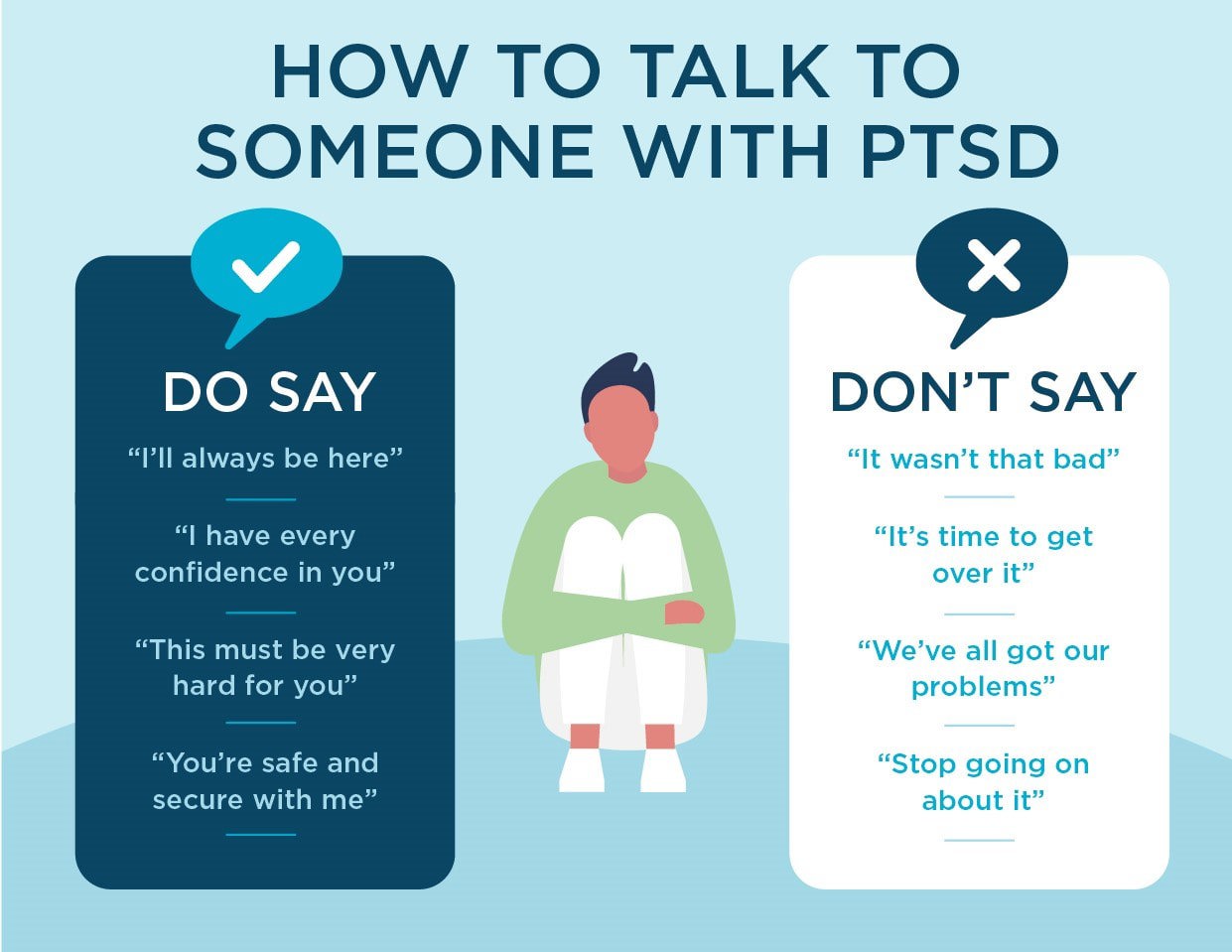Helping someone with post-traumatic stress disorder (PTSD)
It can be upsetting to see someone you care about struggle with post-traumatic stress disorder (PTSD). Here are some things you can do to support them.
It can be upsetting to see someone you care about struggle with post-traumatic stress disorder (PTSD). Here are some things you can do to support them.



PTSD can be debilitating, and the symptoms of PTSD can be difficult to live with and manage. This isn’t just the case for the person who has PTSD; it can also be incredibly stressful for loved ones, friends and family. The condition can have a huge impact on relationships and day-to-day life.
However, it’s important to understand that while you might feel helpless, there are a number of things you can do to support your loved one.
Here, we explore the ways in which you can help someone who has PTSD, and provide tips on how you and your loved one can manage their condition in your day-to-day lives.
We also explore the things you can do to look after yourself as you support a loved one with PTSD.
One of the most useful things you can do is learn as much as you can about PTSD. This includes the signs of PTSD and how treatment for PTSD works. By learning as much as you can about this mental health condition, you can begin to develop an understanding of why your loved one behaves the way they do, and the kinds of emotions they’re experiencing. This will put you in a better position to be able to support them.
It’s also useful to try and identify your loved one’s specific triggers and warning signs. Triggers tend to include specific situations that have a resemblance to the situation in which the trauma occurred. For example, their PTSD symptoms may be triggered by things like:
There may also be some warning signs that they’re struggling, or experiencing symptoms such as flashbacks. Warning signs might be things like:
By getting to know their specific triggers and warning signs, you’ll be able to spot when they’re struggling and anticipate situations that might be difficult for them. This will help you to support them when they need it most.
If you're concerned about your loved one’s immediate safety, call 999 or visit your nearest A&E department. You can find out more on our crisis support information page.
It’s important to keep lines of communication open with someone who has PTSD. Try to check in with them regularly and get a feel for how they are. However, don’t pressure them to talk if they don’t want to. Simply checking in with them shows that you’re always there for them and that they don’t have to suffer in silence.
If they do want to talk to you about what they’re going through, listen to what they have to say. Even if they want to talk about the same things over and over again, it’s important for you to be receptive and understanding, because this might be really important for them and their healing.

If you’ve never experienced PTSD before, it can be difficult to understand what your loved one is going through, or empathise with how they’re feeling. However, it’s really important that you respond to them in a non-judgemental way.
Don’t question why they didn’t do things differently around the time of the traumatic event, or suggest that they should just try to forget about it. Trauma and PTSD are unique to each individual so it’s important to stay open minded and support them the way they need you to, without judgement.
PTSD is a complex illness and recovery takes time. That’s why it’s really important to be patient with your loved one and don’t put pressure on them to get better quickly. Even if the healing process feels long-winded and they’re going through the same things over and over again, stick with them and support them.
While the above tips can help manage their symptoms day-to-day, PTSD often needs professional support. The first port of call might be your loved one’s GP. You could encourage them to make an appointment and offer to go along with them for moral support. Their GP will be able to assess their history and symptoms, and recommend further treatment.
Private providers, like Priory, offer comprehensive and evidence-based treatment for PTSD. This will be tailored to each person and is likely to include a combination of:
Find out more about the types of therapy and the mental health treatment options that we offer.
Supporting someone with PTSD can be overwhelming and draining. That’s why it’s so important to look after yourself too.
Try and set some time aside every day to do something you enjoy or find relaxing. This might be having a hot bath, reading a book or listening to music. Exercise has many great benefits for your mental health, and you should try to eat well and get enough sleep too. You can’t pour from an empty cup, so looking after yourself will put you in a better position to look after your loved one.
Also, it’s important to recognise that you might have mixed feelings towards your loved one sometimes. You might feel frustrated and resentful, and just want a bit of ‘normality’. This, in turn, might make you feel guilty. However, try not to beat yourself up about this. These feelings are entirely normal and don’t mean that you’re a bad person.
There are a number of things you can say to someone who has PTSD, to help them to cope with their emotions and feel better. You could:
As well as the tips above, there are a number of practical things you can incorporate into your everyday life, to help with your loved one’s PTSD.
It can be useful to discuss with your loved one the actions you can both take, in the event of a crisis. Sit down with them when they’re feeling relatively well, and talk about how you can help if they’re ever in crisis. This might include things like:
It’s important to establish with your loved one exactly what they need from you on a daily basis, to help them feel safe. For example:
